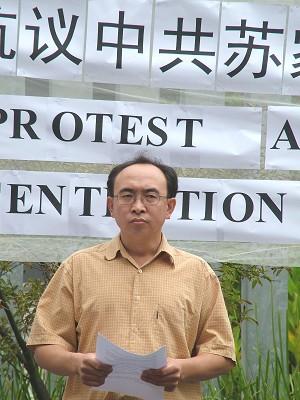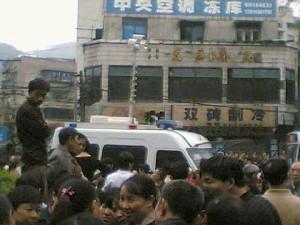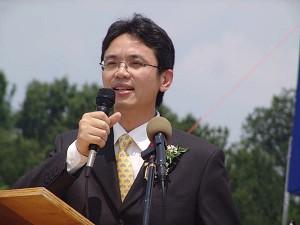First Affiliated Hospital of China Medical University (AHCMU) in Shenyang, also known as Shenyang Medical University, recently confirmed that it costs 70,000 to 80,000 yuan (approximately USD 8,600 to 9,870 ) to replace kidney organs in the hospital. For overseas Chinese the cost is 100,000 yuan (approximately USD 12,300). Yuan Hong, a former surgeon from AHCMU now residing in Sydney, confirmed that since the early 1990s, AHCMU began performing kidney transplant operations with organs extracted from prisoners. When the prisoner is executed, medical staff from the hospital would impersonate soldiers and intermingle amongst executioners so as to quickly remove the organs once the prisoner is executed.
“Don’t worry where it comes from, the doctors will take care of that”
After shocking news of organ harvesting from Falun Gong practitioners secretly detained in Sujiatun Concentration camp was exposed, an Epoch Times reporter called the AHCMU Organ Transplant Section to enquire about organ transplants. The lady who answered the phone said it normally costs 50,000 to 60,000 yuan (approximately USD 6,172 to 7,400) for a kidney transplant. When asked for the source of the kidneys she replied, “Don’t worry where it comes from, the doctors will take care of that.”
When asked if the organs came from prisoners, she answered, “Yes.”
Negative Reports from Overseas Result in Organ Transplants Not Open to Foreigners
Section Chief Wu from Shenyang Medical University talked with an Epoch Times reporter about organ transplant matters. He said that they would have to perform histocompatibility tests before beginning the operation. Presently, this kind of medical service is not open to foreigners and overseas Chinese of foreign nationality have to be carefully considered.
“The situation is very complicated…recently we have received negative reports from overseas—some of the transplants were successful but, for others, complications had developed.”
When asked if the complications were due to drugs being injected into the organs, Wu said, “This will not happen, we use another method. If you are interested just come and we will make arrangements. It will be the local price—70,000 to 80,000 yuan.” However, he refused to disclose the source of the organs.
Strangely, the hospital specifically mentioned that, “For overseas Chinese performing an organ transplant here—we have to change your name first.” When asked for a reason they replied, “That is part of the procedure.”
Health Office Hung Up When Asked About “Organ Transplant”
The Epoch Times reporter called the office of the Sujiatun region health department (telephone no: 24-89813354). When asking about organ transplants, they promptly hung up the phone. There was no answer when the reporter called again.
When Xin Cheng Zi regional hospital (telephone no: 24-89865267) was asked about the same matter, the reply was that regional hospitals do not perform organ transplant operations, you would have to go to the hospitals in the city and/or a university affiliated hospital.
Common Knowledge: Kidneys Come From Prisoners
Mr. Yuan Hong, now living in Sydney, worked in the First Affiliated Hospital of China Medical University for over ten years. He said at a protest in front of the Sydney Chinese Consulate on March 14, 2006, “Since the early 1990s, our hospital began to perform kidney transplant operations. The kidneys came from prisoners.”
“On the day of the execution, the hospital would send a team to the execution site. This team is made up of staff...surgeons, anaesthesiologists and operating theatre nurses. They would be dressed in army uniforms as camouflage and mingle amongst the troop of executioners lest they be discovered. Hence, when we see colleagues wearing army uniforms walking around the hospital, we know there is going to be a kidney transplant operation on that day.”
Yuan Hong added, after the prisoner is shot dead, doctors and nurses would quickly carry the prisoner into a waiting vehicle; the anaesthesiologist would immediately insert a tube into the convict’s trachea, and then perform artificial respiration to extend the life of the organs. At this stage, the prisoner must still be alive or else it would be pointless to insert tubes or give artificial respiration.
After the doctor has harvested the kidneys from the prisoner, the hospital is notified immediately and the operating doctor at the hospital starts to remove the patient’s defective organ so that once the new kidney arrives, the transplant can be performed.
Yuan Hong also said, to his knowledge organs harvested from executed prisoners for transplant operations included hearts, lungs, livers, eye corneas, etc.
Further, Yuan Hong said it was common knowledge in the hospital that kidneys used in transplant operations came from prisoners. But people are indifferent. It never occurred to anyone that this was an infringement of human rights nor illegal.



